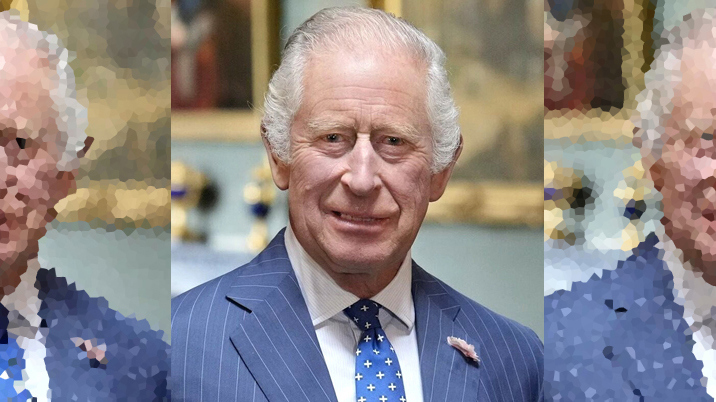
Rishi’s vows
There’s no stopping the man. The pledging and the promising and the vowing. This week it’s been building houses, cutting taxes and calling out Starmer’s “dirty tricks” to score a hat-trick of vows in the space of five days; just the one in the Express but two in the Times. Eat your heart out Erling Haarland.
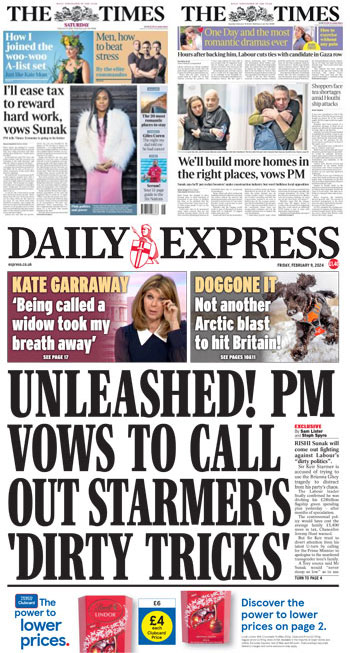
You expect this kind of devotion from the Express, but what’s going on at the Thunderer? A couple of weeks ago, a diarist suggested elsewhere that the not-so-retiring big chief had had enough of Sunak and was encouraging a putsch to bring in Kemi Badenoch, “the new Mrs T” as the Sun had it. Now the Times is full of Rishi: a splash and spread interview on Saturday and a splash and bylined piece on Tuesday to complete a spread on that GB News appearance.
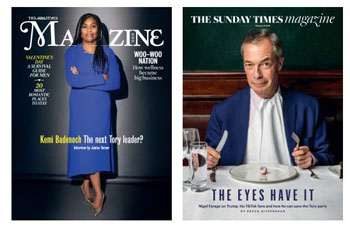
We learnt this week that Rupert Murdoch had five face-to-face meetings with Sunak in the year to September, and this flurry might give the impression of loyalty, that there is still some hope of staving off the inevitable. But the paper – or its ultimate boss – is clearly hedging its bets. That Saturday lead sat alongside a photograph of Ms B, who had been interviewed by Janice Turner to provide the cover story for the magazine. Headline: “The next Tory leader?” This was all too much Tory (or any kind of politics) for me – taking up every millimetre of front-page news space on the day that’s supposed to bring in the punters. Whatever happened to a bit of lightness and freshness on a Saturday? Puffs around the edges don’t really do the job.
Then the next day, the Sunday paper had Nigel Farage all over the top of its front and as its magazine cover boy on how he could “save the Tory party”. Meanwhile, the daily is avoiding the Mail trap of all-out rubbishing of the man it is most likely to have to do business with next year; the man most likely to hold the Press’s fate in his hands. Even with open goals such as the green spending retreat and the Rochdale by-election candidate fiasco, not to mention what appears to be an inside track on an internal leak investigation by Sue Gray that has apparently upset some party officials.
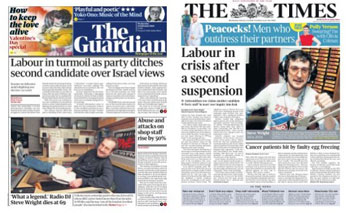
Yesterday, for example, while the splash was about “Labour in crisis”, and incorporated the added Gray factor, the Times was less brutal in its coverage than the Guardian’s Labour “turmoil”. The Times inside spread focused on the Gray inquiry and had a withering Tom Peck sketch, while the Guardian homed in on the differences between the slow abandonment of Rochdale hopeful Azhar Ali and the summary justice meted out to previous (leftwing) Labour miscreants, notably Diane Abbott and Rebecca Long-Bailey. And, of course, the treatment of Jeremy Corbyn.
Well, you expect the “broadsheets” to tell news stories straight. But let’s look to three recent editorials to see what the Times really thinks. The green reverse brought a leader welcoming the policy shift, but cautioned Starmer to avoid repeating such a screeching U-turn in government; the second also concluded that Starmer had done the right thing in disowning Ali, but wondered why he and his advisers – “who are no fools” – took so long to do it. The third yesterday, after the suspension of another candidate who had also been disobliging about Israel, despaired of the leadership’s clumsy initial response to Ali’s remarks, but almost as an aside to its main point about the rise in anti-Semitism, which was not “confined to the fringe of leftwing politics”.
There is reference to the “dark days” of the Corbyn era and criticism in all three leaders of dither and drift, but there is also tacit acceptance that Starmer’s party is not inherently anti-Semitic and, most of all, the recognition that Keir, not Kemi or Nige, will probably be our next prime minister. As such, the pragmatic course is to offer guidance and advice, not vilification.
Starmer’s u-turns
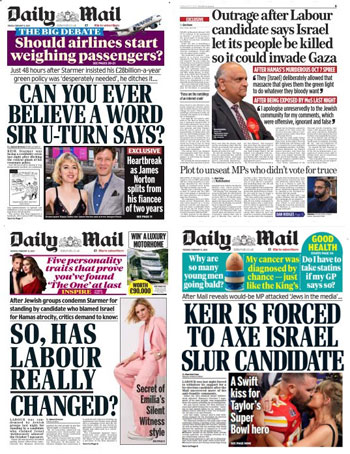
The Mail, of course, is having none of that. And it will have been buoyed by what in its terms must be regarded as a successful week – one that could have gone quite the other way with Sunak buffeted by unwise bets, anti-trans jokes, uncomfortable economic data and the prospect of a couple of by-election defeats tonight.
First it turned Sunak’s PMQs Brianna gaffe into a Starmer outrage (courtesy of the nimble-thinking Badenoch). How dare he use the brutal murder of a teenager as an opportunity for political point-scoring? Next came the environmental budget: “Can you ever believe a word Sir U-Turn says?” (even though it has been knocking the £28bn promise forever). And then its Rochdale scoop with the candidate’s anti-Israel conspiracy theory.
You have to hand it to the Mail; it knows how to do this stuff. The quote about Israel inciting the October 7 Hamas attack should have been enough to seal Azhar Ali’s fate. You might think that the Labour leadership might look a little further before accepting his apology and “moving on”. But no, it sent shadow ministers out on the broadcast round to defend him. Does it not understand how the Mail operates? Did it not think that it might have something in reserve? And of course it had. The day it ran its “So has Labour really changed?” follow-up splash to its Sunday sister’s scoop (which didn’t even make the lead), it was pulling together more damning material. That allowed it a further trumpeting splash “Keir is forced to axe Israel slur candidate”, with the Mail’s role up in lights in the strap.
Boris tease
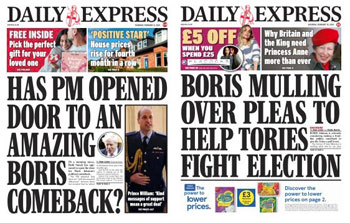
The Express was meanwhile misleading readers who might still be dreaming of the blond king over the water, asking, “Has PM opened door to an amazing Boris comeback?” Well, let’s be clear. Whatever you might think that headline means, it does not mean that Carrie will be moving her furniture back into Downing Street. Johnson might be persuaded, perhaps, to do a bit of campaigning – as the Express more honestly put it a couple of days later in “Boris mulling over pleas to help Tories fight election”. Or even to take a seat on the red benches. But Express readers should realise that he will not be back in the Commons. For one thing, he won’t want to risk defeat by standing for election. And, for another, he’s barred from the place.
Which way will Fleet Street turn post-election?
We have seen how the Times is preparing for the possibility of life under Labour, but I do wonder what those whitetops are going to do if the country does give Starmer the keys to No 10. They can’t spend five years moaning. Well, they can. But not every day surely? And they (well, I’m talking about the Express here, mostly) can’t carry on with the promising about how wonderful it will be when the Tories get back. They will have to look for new mainstays.
The Mail has always been more eclectic with its subject matter, but if you take “EU is horrible” and “Dave / Theresa / Boris / Rishi says everything is going to be wonderful” out of the armoury, the Express begins to look a bit bereft. Alzheimer’s and pensions are still bankers, immigration is still high. But after that? I can’t see a return to “rhubarb adds years to your life”. But benefit scroungers? Anyone below the poverty line with more than two children had better beware. And there’ll doubtless be a few new twists in the Madeleine saga.
The key thing is, if there’s the predicted landslide, how do these papers (and the Telegraph, but less so the Sun, which can always turn to football and Love Island) avoid looking out of touch and irrelevant? For now, they are obviously going to throw the kitchen sink at Starmer in the hope that we’re reliving 1992 rather than 1997. But surely there must be some planning behind the scenes for how not to look completely ridiculous if the country sticks two fingers up not only at Sunak and his party, but also at the papers that promoted him.
Back in the late seventies and early eighties, when Labour was in the wilderness, party activists argued that they couldn’t break through because they weren’t left-wing enough. Some are still pressing that case today. With some justification, I think. People are crying out for Starmer to be bolder, not simply to offer more of the same but “nicer” and with less cronyism – to the point where Sunak is selling himself as the “change” candidate.

Now the Mail, Telegraph and Sun are all playing the same game in reverse: seeing salvation for the Tories in being more rightwing. We saw it with the Mail’s campaign to get Truss as Prime Minister, we see it in Allister Heath’s columns every week, we see it in Trevor Kavanagh, who this week urged Rishi to “turn right” to avoid the iceberg. Braverman and Frost are given space to dispense their medicine: dump the ECHR, bin inheritance tax, clamp down on the woke.
There is no doubt that people are dismayed by the levels of immigration, but do they really care more about gender wars than about having to wait hours to get a cut stitched or years for a new hip? More than their children being taught in overcrowded classrooms because there aren’t enough teachers and there’s a risk that the ceilings of some rooms might fall in?
Boris Johnson purged the parliamentary party he inherited of remainers to force Brexit through and then shaped the future Commons by demanding what came down to an oath of allegiance to Brexit as the price for a place on the candidates’ list. Caring Conservatism and One Nation Tories are not wanted now by those in power or the papers that back them. Instead, we have “New Conservatives” and “Pop Cons”. The leadership frets not about Labour but about the Reform Party (and most of all about what Farage is going to do). It threw everything at tearing down the Brexit-backing Red Wall and now it realises it’s going to lose that, whether to Starmer or Tice / Farage. But now along comes another poll, from Survation, that shows the party is in real trouble in its heartlands. That out of 100 rural seats that it ought to be able to bank on, 51 look likely to go to Labour.
Out of touch with real people?
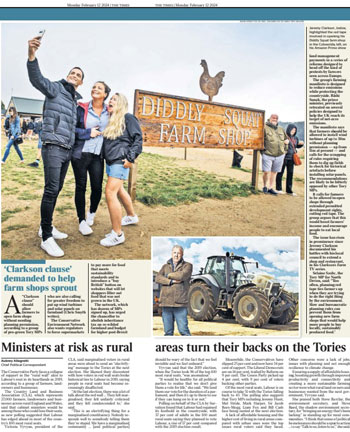
Somewhere along the line, the Conservative party, the Mail and the Telegraph have all lost sight of their core supporters, the middle classes who don’t see Brussels as the antichrist, who don’t fear seeing black and brown faces or hearing Polish and Chinese accents next door, and who don’t care what pronoun anyone uses. People who do care about having their tyres and suspensions wrecked by roads full of potholes.
The Tories took them for granted at their peril and the rightwing press is playing a similarly dangerous game. Whether you are a labourer in Nottingham who voted to leave the EU or a solicitor in Guildford who voted remain, your key aspirations are likely to be the same: to be allowed to get on with your life, go to work, get a decent wage, have a nice holiday with the family, and be looked after when you fall sick or get old. You don’t have to be a wishy-washy liberal to see that. Yet politicians and press alike seem determined to stoke division, determined to find “enemies” that want to do you down.
Labour activists were deluded in thinking that a Benn or a Corbyn would ever break through and gain power. The left-leaning press recognised that and were accused of undermining the movement for their trouble (the fact that the complaints were justified is irrelevant, even if the Guardian had been whole-hearted in its support for Corbyn, he’d still have lost). The Tory right didn’t need to break through to get a toehold, since the moderates had already won power for their party. But the papers that support the Moggs and the Bravermans are as deluded as the Bennites in thinking that the route to public approval is to move ever further towards the edge. It may be more exciting than the warm bath in the centre. But the risk of toppling over that cliff is great. As Truss found to her – and the country’s – cost.
We are nearly a quarter of the way through this century. We have had 9/11 and the wars in Afghanistan and Iraq that followed, global financial meltdowns and variously coloured revolutions. Ukraine and the Middle East are tinderboxes. Putin is terrifying and the prospect of the Western world being led for the next four years by one of two inadequate geriatrics hardly calms the nerves. Domestically, we have had five years of austerity, five years of Brexit negotiations and five Conservative prime ministers – four of whom took office without any input from the electorate. Not to mention three referendums and a pandemic. People are working harder, longer, and for less money in real terms. The country is in need of a rest. And they do say that a change is as good as a rest. If the press wants to remain even remotely relevant to its readers, it needs to recognise that.
Collectors' items
One last thought on this political ramble: it occurs to me that this year’s election will likely be the last to be covered in print by the Express and Mirror and possibly the Guardian and the i. For what are the chances of their dead-tree journalism surviving another five years? The long-predicted demise of the newspaper you can hold is really that close. Sad. And scary. Because websites are wonderful places for burying inconvenient news. Just search for Prince Harry’s court cases and you’ll see what I mean.
Harry: the prince who can do no right
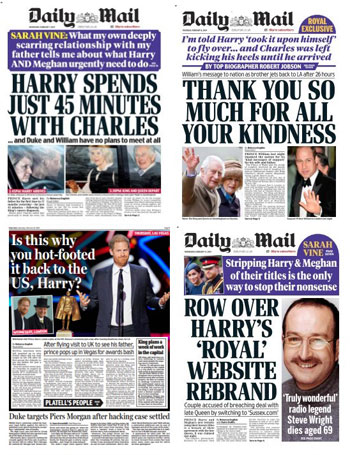
Ah yes, Prince Harry. He has been the cherry on the cake of the Mail’s splendid couple of weeks. There was a bit of a wobble at first – him doing the dutiful son bit and flying over at a moment’s notice after the King’s cancer diagnosis. But we were soon back on track when we learnt that he had spent only 45 minutes with his dad (30 if you believe the Sun). Then we learnt that he had “taken it upon himself” to visit, leaving the King “kicking his heels” waiting for his arrival.
Now he’s rebranded his website and there’s a “row” (though the paper doesn’t say who’s doing the rowing, there’s a lot of unnamed “sources”) over whether he has broken his promise to the late Queen about using his royal status for commercial gain. And, if he has, whether the Palace is going to do anything about it. But, oh, the timing. So thoughtless.
Sarah Vine has had much to say. First, she offered advice, based on her own experience of course, of what H&M urgently need to do to mend fences with the family. But a week later, that Sussex.com domain name was just too far beyond the pale for her. They must be stripped of their titles. It’s the only way to “stop their nonsense”.
Amanda Platell has also been rifling through the knife drawer, declaring on Saturday, “William must never forgive his shameless fly-in, fly-out brother Harry”. Earlier in the book, a news story asks, “Is this why you hot-footed it back to the US, Harry?” He had gone to hand out an award at a Superbowl-related celebration of American football stars in Las Vegas.
So Harry was wrong to “take it upon himself” to visit sick father, wrong to spend “only” 45 minutes with him – even if the length of the visit were dictated by the King – and wrong to fly home again. If he had stayed in the States, he’d have been wrong and uncaring. If he had stayed here and not attended the awards bash, he’d have been wrong for letting people down.
I hope we’re clear on that now.
What did Piers know?

The Mail did, however, have the good grace to put Harry’s latest salvo against Piers Morgan on page 5 under that Vegas story. The Telegraph did even better, running it on the front with a picture, pointing to page 6. The Times made it the focus of a fairly early spread.
In case you missed it, the Prince settled his hacking claim against the Mirror on Friday, accepting a “substantial sum” in damages (reportedly £300,000) and all his costs. After the judgment in this and cases brought by other claimants, his lawyer, David Sherborne, read out an excoriating statement from Harry, saying that Piers Morgan “knew perfectly well” what was going on under his editorship and that the rule of law should be enforced. In other words, the cops should wake up and investigate. Which they won’t.
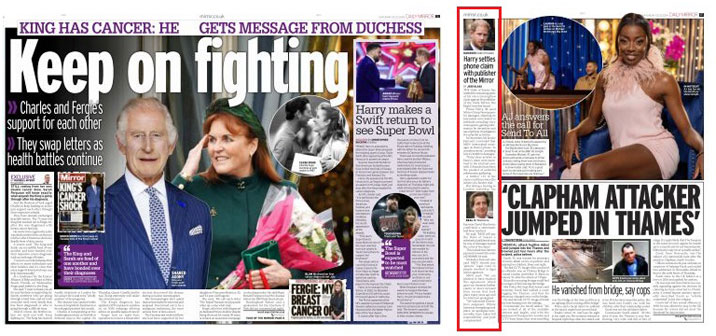
The Mirror led the next day’s paper on the King “bonding” with the Duchess of York over their cancer diagnoses, with more on the 4-5 spread. That also included a picture of Harry making a “Swift return” (see what they did there?) for the Superbowl. There was no cross-reference to the hacking settlement, which was recorded in a single on page 17. This included a statement from MGN referring to “historical wrongdoing” for which the group apologised unreservedly and took full responsibility. The words ‘Piers’ or ‘Morgan’ did not feature.
The King and the big C
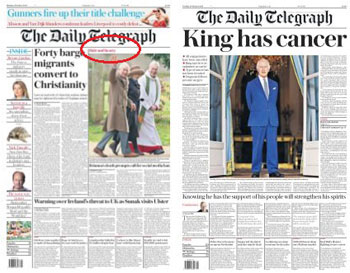
The real royal story of the year, though, was obviously the announcement that the King has cancer (which made the previous day’s “hale and hearty” headlines over the picture of him at Sandringham look a bit unfortunate). Everyone was naturally going to go to town on this one, but even after all these years, it never ceases to amaze me how much papers can find to write about something borne of a 138-word statement containing one basic fact – and with a key element missing.
Yes, there was constitutional stuff to be explored and plenty of people were offering sympathy. But after that, it’s all basically guesswork – a former colleague has long held that royal reporting is a licence to invent stuff; that those who talk know nothing, those who know, say nothing.
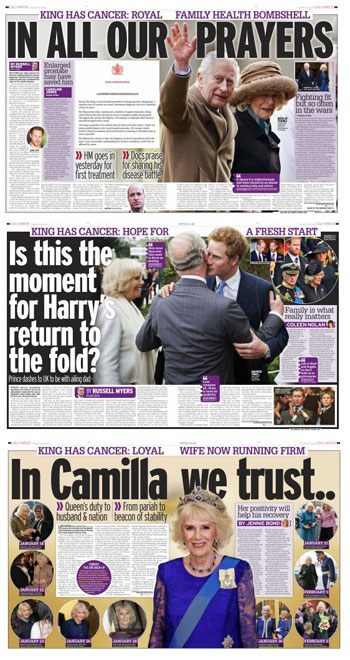
Which is why this part of the statement sent the irony meter off the scale: “His Majesty has chosen to share his diagnosis to prevent speculation.” Right. Just for the record, in the three days after the announcement, the Mail carried 23 pages on the King’s cancer, the Express 21, the Sun 19, the Mirror 14, the Times 12, the Telegraph 11, the Guardian 8 and the i 7. All doubtless packed with 24ct solid gold fact and not an ounce of surmise.
Brianna Ghey
Let’s finish where we started, with Rishi Sunak – and what should have been a winning PMQs riff on Starmer’s U-turns. Especially in the light of the past week’s events. Why did he have to ruin it with that anti-trans joke? “Of all the weeks…” retorted Starmer. And with Brianna’s mother in the building. Shameless!
Actually, Esther Ghey’s presence or absence should have made not a jot of difference. It’s not a good look for either leader to make political capital out of either the “gender debate” or murder. Sunak emerges from this spat as blind, thoughtless and dim because it didn’t appear to have dawned on him (it may still not have done) that he was effectively saying that Brianna was not a girl. It certainly hadn’t occurred to him that what he was saying could be linked to the motivation behind at least one of her two cruel killers. That Starmer did make that connection meant he was the one who could be accused of faux outrage and political opportunism.
Quest for fame, granted
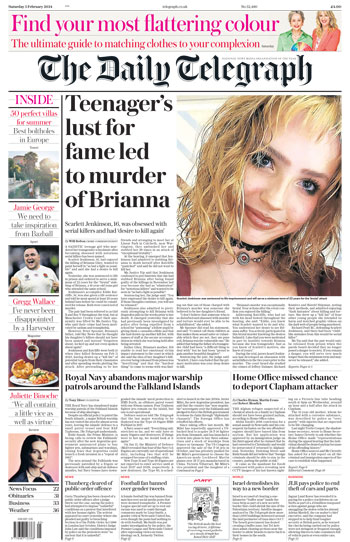
But Sunak was not alone in misjudging the Brianna case. Look at the Telegraph on the day after the sentencing: “Teenager’s lust for fame led to murder of Brianna” read the splash, alongside a photograph of a heavily made-up young woman pouting at the camera. Well done, lads. You gave her just what she wanted. Granted her ambition and projected exactly the image she wanted to present to the world.
The sentencing of those two teenagers was the first time their identities had been disclosed, so there was a news value to the photograph. But only in a moral vacuum. It is possible for newspapers to act with restraint (do you think editors don’t have photographs of the Princess of Wales in a bikini in their safes?). The people acquainted with that young woman and her trans-hating male accomplice were already aware of their identities; for the millions of us who had never heard of them before their court appearance, their names and photographs do nothing more than feed or counter any preconceptions we may have had.
Ask the person next to you today, two weeks on, to name them and the chances are they’ll struggle. Show them the police mug shots – the favoured pictures for most editors – and they’re unlikely to be able to distinguish them from any other criminal. But that posed picture will stick in the mind, granting the killer the recognition she craved. The Mail also used it on the front, the Mirror and Times put it inside. The Sun, Guardian, i and Star all left it where it belonged. Out of sight. (And yes, by rights, we shouldn’t be reproducing the Telegraph here.)
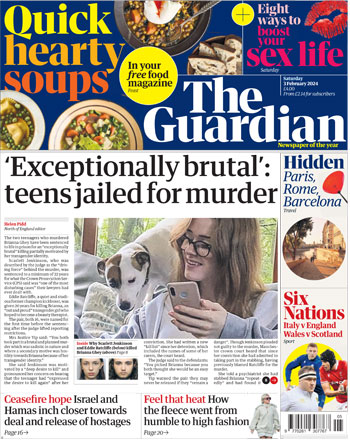
The person who should have been on all those front pages was, of course, Brianna. But only the Guardian obliged in making her its big picture. She is the one we should remember. Jacinda Ardern made this point so eloquently after the Christchurch massacre. Her refusal to give the killer any kind of publicity was much applauded, but not much heeded.
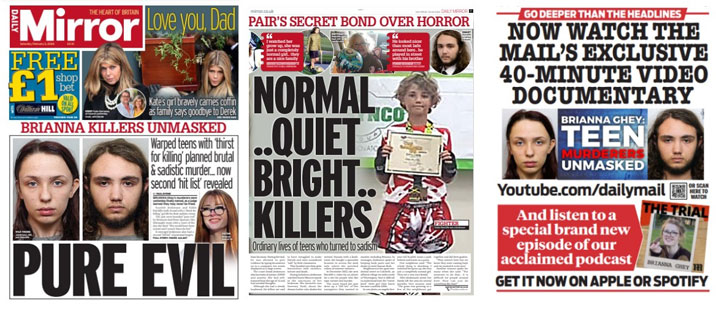
Some newspaper editors really can’t help themselves. They think that by shouting “monsters” or “evil” they are speaking for society in heaping opprobrium on criminals whose behaviour would be condemned by any right-thinking human being. But this lexicon of murder lends cachet to people who should be dismissed as nonentities. They could not be “named” or “identified”, they had to be “unmasked” – as though this pair of sullen adolescents were Zorro or Superman. The other save-get approach is to focus on how “normal” they seemed, how “quiet”, how intelligent. The Mirror managed a full house of these clichés in the space of a splash and one of its two spreads. Do they not see that all they’re doing is pandering to the baser instincts of their readers? As the Mail did yet again with a full-page puff to its true crime podcast.
For justice to be done, it has to be seen to be done. It has long been a given that naming and shaming is a part of that. But being shamed means having your failings brought to the attention of those who know you, people you might have to look in the eye – not complete strangers you have never met and will never meet. Every instinct I have tells me that the judge had to allow the media to name those two killers, that justice demanded it.
But listen to Brianna’s dad, Peter Spooner: “At first, I thought they should be named. Why should they be protected? People should know who they are. Now, I think their names are always going to be tied to Brianna’s all the time. I think they should just be forgotten about, locked up and not be spoken about again. They’re nothing.”
And now tell me he was wrong.
The Times’ “trans wars”
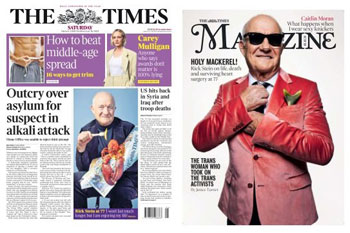
While most papers went with the Brianna case as their main picture that Saturday, the Times preferred Rick Stein, who – like Badenoch the following week – was their magazine cover star. There was no mention of the trial anywhere on the front; its first mention coming on the 6-7 spread. Here it put the police mugshots at the top of the central picture complex. Brianna was at the bottom, below a photograph of people in forensic suits and far smaller than a reproduction of a note outlining the murder plan (which needed to be legible). Brianna did at least take the main slot on another composite on the next spread (which is where that posed photograph of the killer appeared), but this was a CCTV grab of her on a bus riding to her death. Nowhere in the paper was there a decent photograph of the central character in this tragedy, one to make readers feel “this is who it’s all about”.

Is that because the Times has a problem with trans people? Well, whatever it may protest, it surely does. It’s obsessed.
On that very day, though, it was giving space to a trans woman to have her say. A lot of space – second billing on the magazine cover and five pages inside. Sadly, this wasn’t to give “the other side” of the argument, tell the story of what someone had gone through finally to feel at ease in their body; how they had been supported – or otherwise – by family, friends, colleagues. Statistics on suicides and self-harm, perhaps. Or even basic numbers about how many of these souls there are in this country, how many have surgery, how many are happy, how many have regrets.
No. It had to be, “The trans woman taking on the trans activists”, a woman questioning her decision to transition, a lot of psychology about men who dress up in women’s clothes to become someone they fancy, and, among the sophisticated outfits, a photograph of the subject in a t-shirt emblazoned “Trans women are men, get over it”.
Keir Starmer might well have bemoaned Sunak’s timing, but his words should echo round the Times office too: “Of all the weeks…” Did nobody stop to think for a minute about what would be on the news pages the day that magazine was published? It was there for anyone to see. The sentencing hearing was fixed for February 2 on the day the killers were convicted last December. Newspapers have diaries. Departments are supposed to talk to each other.
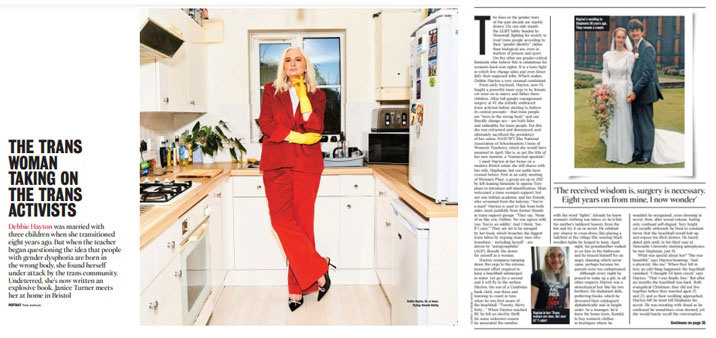
Even if it hadn’t been such a big number, avoiding any sort of clash would have been difficult, given that there’s some anti-trans content in the paper virtually every Saturday. It seems that every interviewer is required to ask their subject for their views on “gender wars” – for Janice Turner to raise it with Badenoch for last weekend’s magazine was as easy as falling off a log, but you have to admire (if that’s the word) Andrew Billen for squeezing it into a conversation with the archaeologist Alison Roberts. Ten years ago, she had made a documentary with Michael Mosley asking “Is your brain male or female?” Now she and Billen were talking about whether there is a fundamental difference between male and female brains. “I am not trying to propel Roberts back to a 2019 skirmish in the trans wars…” he writes. Of course you’re not, dear. Perish the thought.
But that use of the phrase “the trans wars” with no qualification, as though it’s definitely a Thing about which there can be no argument. That’s the giveaway.
Front page of the fortnight
The King’s cancer diagnosis was the shock story of the fortnight that was almost bound to produce the best covers. The Times and Telegraph both went for the sombre, restrained approach, rightly jettisoning the puffs; the Express and Sun each came up with clean elegant pages.
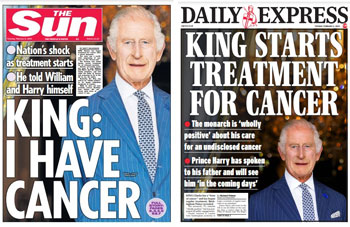
But my page of the fortnight – based entirely on style over substance (in other words, I may not agree with the content, but think it well projected) – was this from the Sun. Nice design and a good pun. Especially if you want to take yet another dig at Harry.
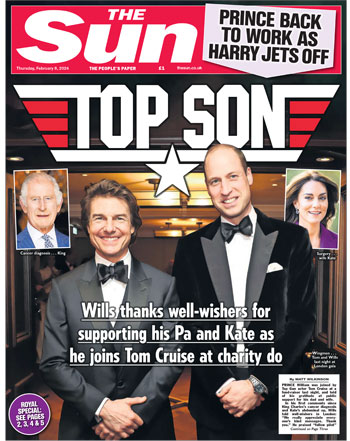
Liz Gerard’s Notebook is a fortnightly column published in the InPubWeekly newsletter. To be added to the mailing list, enter your email address here.












